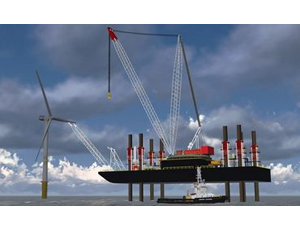

Utility companies National Grid and NStar on Jan. 6 said they were withdrawing from their commitments to buy power from the Cape Wind project. A $2.5-billion initiative to build 130 offshore wind turbines in Massachusetts' Nantucket Sound, Cape Wind has been beset by delays and issues, including a late change in contractors and fierce opposition from local advocacy groups.
The two utilities cited a clause in their power-purchase agreements that required Cape Wind to begin construction by the end of 2014. There was a provision for Cape Wind to extend the deadline with a financial stake, but the utilities say no such arrangement was made in time.
"We are evaluating our options," Mark Rodgers, Cape Wind communications director, told ENR. With the utilities' withdrawal, they take with them a commitment to purchase over 77% of the power generated by Cape Wind.
"National Grid is disappointed that Cape Wind has been unable to meet its commitments under the contract," says Jake Navarro, a spokesman for National Grid. "We will continue to pursue other renewable options."
National Grid had agreed to purchase up to 50% of the power generated by the Cape Wind facility. NStar, which was acquired by Northeast Utilities in 2012, signed on to purchase 27.5%. NStar cites Cape Wind's failure to meet the crucial end-of-2014 deadline as the reason for the contract termination. "The deadlines Cape Wind has missed were contractually agreed upon by both companies," says Michael Durand, spokesman for Northeast Utilities. "Cape Wind has missed these critical milestones."
For the opponents of Cape Wind, the announcement comes after a protracted battle. "It's a major step, but I would not declare victory yet," says Audra Parker, president and CEO of the Alliance To Protect Nantucket Sound, an organization that opposes the Cape Wind project. "It's a near-fatal blow, but the project has taken many twists and turns over the years, and it is unclear whether Cape Wind will challenge the contract termination."
In August 2014, Cape Wind awarded a construction contract to a team of Weeks Marine and Manson Construction, after ending a relationship with a joint venture of Flatiron Construction Corp., Cal Dive International Inc. and Cashman Equipment Corp. Both Weeks Marine and Manson Construction declined to comment on the utilities' recent decision.
On land, work is almost complete on a $113-million marine terminal in New Bedford, Mass., intended to serve as a staging area for Cape Wind's turbine installation. The terminal is engineered to handle heavy loads associated with offshore wind turbines and other large marine cargo. The owner, Massachusetts Clean Energy Center, a quasi-public agency, promotes renewable energy. "[The decision] is a setback for the offshore wind industry," says Bill White, MassCEC director for offshore wind development. "But we have always planned for this to be a multipurpose facility."
White says the terminal can serve future East Coast offshore wind installations. "The first project is often the most difficult. I think offshore wind will emerge. Our facility is uniquely designed for such work."



Post a comment to this article
Report Abusive Comment